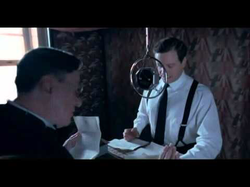The Importance Of A Good Relationship
Why you need a strong relationship in your story.
From guru Lindsay Doran, a reminder to make sure your Relationship Story Throughline is strong and clear:
“What shocked us,” said Dan Lin, a producer of the Sherlock Holmes films whose team recently watched a Doran presentation, “were Lindsay’s points about what audiences care about most — relationships and the positive resolution of those relationships. We had previously thought what was most important was the lead character winning at the end of the movie.”
The Dramatica theory of story doesn't consider a narrative complete or functional unless it has this subjective Relationship Throughline to act as a counter-balance to the Objective Story Throughline. Although you wouldn't know it to look at it, the theory does cover the Relationship Throughline quite extensively. As Dramatica Story Expert Mark Haslett explains in an ancient AOL chat class:
There can be success in the Subjective Story as there is in the Obj. Story. People just don’t think in those terms often ... There are actually appreciations in the software which we offer to describe the dynamics of the Objective Story which also exist for the subjective story, yet are not available to choose from. This is really due to our developing understanding of the theory and in the future they will be available also ... If the relationship between the Main and Obstacle character turns out “positively” or in a way they would agree was successful that would be something like the SS appreciation for Outcome.[^oldterms]
Hopefully someday we will get some controls to dial in the Relationship Throughline dynamics. It's only been 18 years since Mark wrote that, so I'm sure it won't be that much longer now.
I always think of the Relationship Throughline as if it is growing towards something positive, or dissolving away to something negative. Relationships are about analog dynamics, not digital switches (like the Objective Story), so you always want to think of the direction things are headed. A good analogy is to think of this part of a story as driven by knobs, not toggles. If the two central characters resolve positively then the Relationship Throughline Solution comes into play. If they don't, the Relationship Story Problem will persist between them.

Back to Duran:
Audiences don’t care about an accomplishment unless it’s shared with someone else. What makes an audience happy is not the moment of victory but the moment afterwards when the winners shares that victory with someone they love.
A little gooey and a bit too prescriptive (not everyone likes a happy ending), but again--points for the Relationship Throughline.
[^oldterms]: By Obstacle Character Mark means Obstacle Character and by Subjective Story he means Relationship Throughline story. These were old terms--befitting of an AOL Chat Class from 1997.
Download the FREE e-book Never Trust a Hero
Don't miss out on the latest in narrative theory and storytelling with artificial intelligence. Subscribe to the Narrative First newsletter below and receive a link to download the 20-page e-book, Never Trust a Hero.

